To leave or not to leave: The cry of Hong Kong's youth
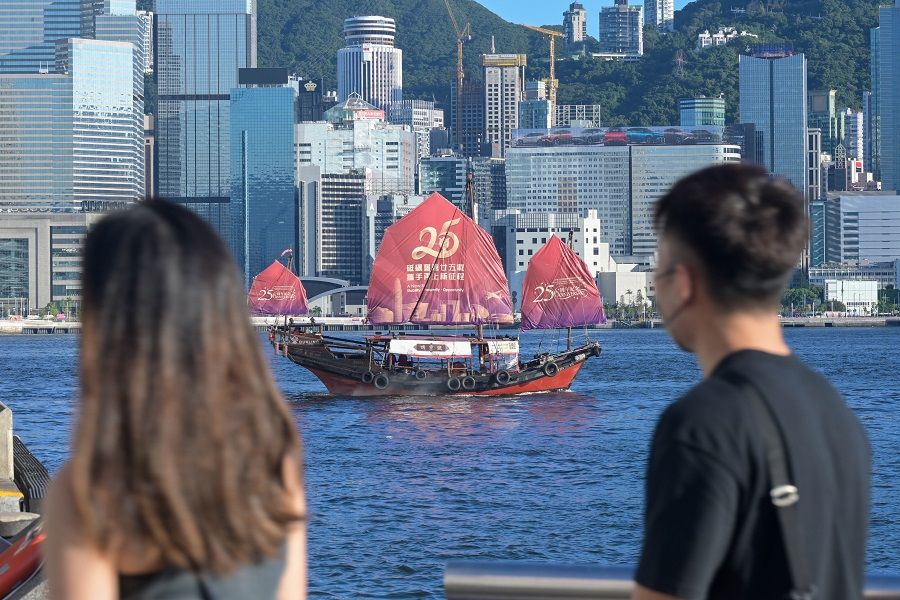
Under the dense, humid weather of Hong Kong, life seems to be returning to normal. The Omicron wave is ebbing from its highest point of over 60,000 cases per day, and restaurants and shops are once again open after months of lockdown. The monsoon season is approaching, and the summer heat and low air pressure makes breathing quite hard. The streets are filling up with people and traffic again, as passers-by once again hurry by on the bustling streets.
Out of boredom in the tiny flat I call home, I turn on my phone and open the LIHKG app, a forum app very popular among young adults. Though the interface has stayed the same, one can easily tell that things have drastically changed - in fact, the app is almost unrecognisable. Three years ago, young protesters mobilised themselves in different rallies throughout the city, passed on locations of police barricades and shared memes and posters rallying for the cause. Now, the feeds are mundane everyday banalities or occasionally heated discussions on who is to blame for the stagnant reality we live in.
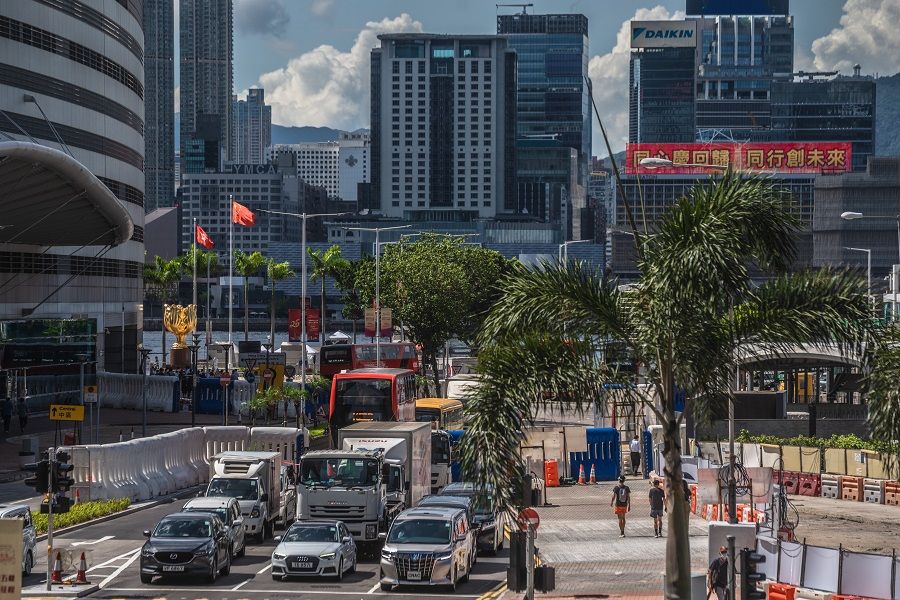
Interesting enough, a new section is now dedicated to users who have already migrated overseas. Now scattered across places like Toronto, Sydney, Taipei and London, these users share tips about living in a foreign country, such as how to obtain visas and employment. There are occasional threads about overseas rallies and gatherings during key protest dates, and it is surreal - even with the same slogans and motifs, it is not quite the same as the scenes Hong Kong witnessed three years ago, and it is all quiet on the Hong Kong streets.
In 2020 alone, 93,000 residents left the city, citing Covid restrictions and the erosion of freedom... in the first two months of 2022, amid the worst Covid outbreak, the number spiked to 78,000.
A very real exodus
In 2020 alone, 93,000 residents left the city, citing Covid restrictions and the erosion of freedom. 23,600 joined them in 2021, and in the first two months of 2022, amid the worst Covid outbreak, the number spiked to 78,000. These leavers, locals and expatriates alike, are not expected to return for the same reasons. A recent poll by the Public Opinion Research Institute (PORI) revealed that a whopping 24% plan to leave, and the trend might accelerate.
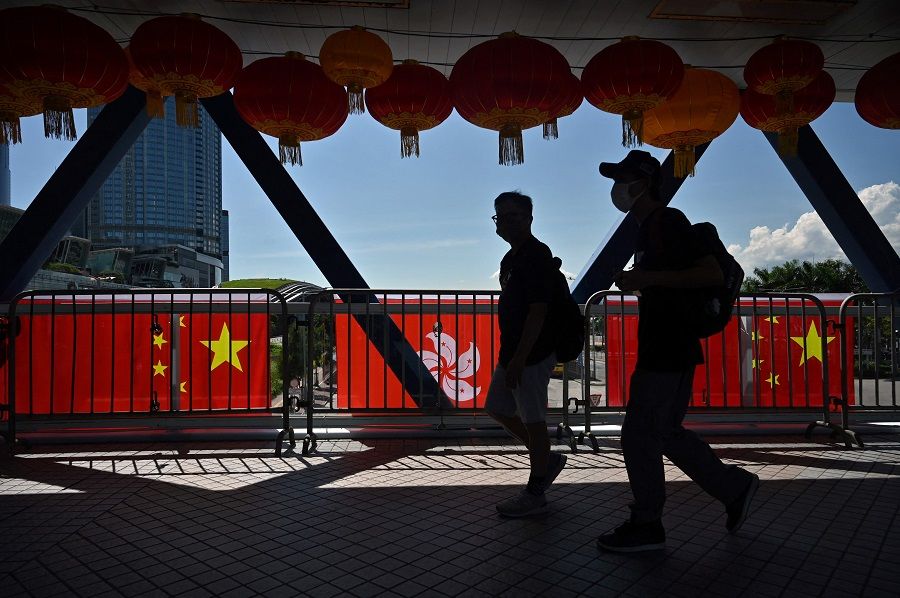
Every time I open up YouTube for some music streaming nowadays, I sense that "emigration" and "staying" are an omnipresent motif of the Hong Kong identity. A rock band named C Allstar became an instant hit last year with their singles For Those Who Stay, For Those Who Had Left (留下來的人) and Together We Strive For A Better World (集合吧!地球保卫队) exploring the themes of keeping one's ideas and identity when leaving their city behind. Songs from bands like RubberBand and Dear Jane, which subtly call for Hong Kong to stay strong no matter where they are, resonate with the younger audience and have topped the charts.
"'Red lines' keep changing, and we're moving towards blind loyalty to the authorities. The political environment in Hong Kong is almost like China, and it is not even 2047 yet." - Vanessa, a 21-year-old student
Vanessa, a 21-year-old student, is one of the Hong Kongers who has left the city. Studying for a social work degree in Australia, this pro-democracy young woman once aspired to see her city become a full-fledged democracy. Though sceptical about the eventual violence that erupted, she supported the pro-democracy movement and hoped the vision would be realised peacefully one day. But right now, she plans to stay overseas and fears anything can be deemed too sensitive.
"Hong Kong will always be my home, and I want nothing more than real democracy. But under the national security law, it's hard to see a positive outcome", she told me. "'Red lines' keep changing, and we're moving towards blind loyalty to the authorities. The political environment in Hong Kong is almost like China, and it is not even 2047 yet."
Beijing imposed a national security law in July 2020 that outlawed any forms of dissent, acts of terrorism, subversion and secession. It also gave police sweeping new powers of arrest, which alarmed civil society groups as China has used similar vague laws to silence dissidents.
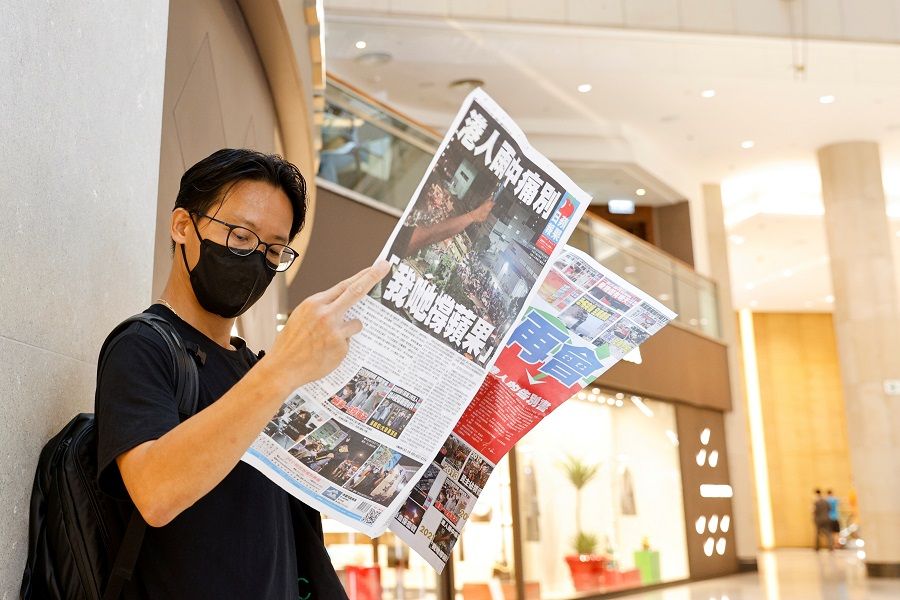
183 people have since been arrested under the police's new National Security Department, including activists, journalists, pro-democracy politicians and students. Many are still in custody and could face life imprisonment. Independent media like Stand News and Apple Daily, once very outspoken before and during the protests, are now shut down and their executives behind bars. Even the city's retired Catholic bishop, Cardinal Joseph Zen, was arrested for his role in the 612 Humanitarian Relief Fund, which aided protesters during the 2019 pro-democracy protest.
Outgoing Chief Executive Carrie Lam hailed the law as a "glorious mission" in restoring order and stability. Authorities reiterated that the arrests are about whether the defendants "have broken the law" rather than who they are.
Anyhow, this is all too heavy for a Saturday. It's time to head out to our friends' housewarming party at their new flat by the harbour. After hailing an Uber, my wife and I set off. Under grey clouds and the occasional hard drizzle, the car travels across the harbour and onto the expressway, passing the empty Victoria Park where vigils for the Tiananmen Massacre used to take place annually for three decades.
Ah yes, it is already 4 June.
Is a changed Hong Kong still home?
But this year, the vigils are all but history. The authorities were quick to ban the vigils, citing both pandemic measures and the national security law, and the police had warned the public not to test their resolve. While the six football fields stand empty, the premise is filled with riot police lest anyone enters and begins a vigil. Organisers for last year's version are facing prosecution, and any physical memorials, including the Pillar of Shame on the University of Hong Kong campus, have been removed.
"What makes Hong Kong good is what Beijing wants to wipe out, so I see no advantage for us." - Leonard, a financier
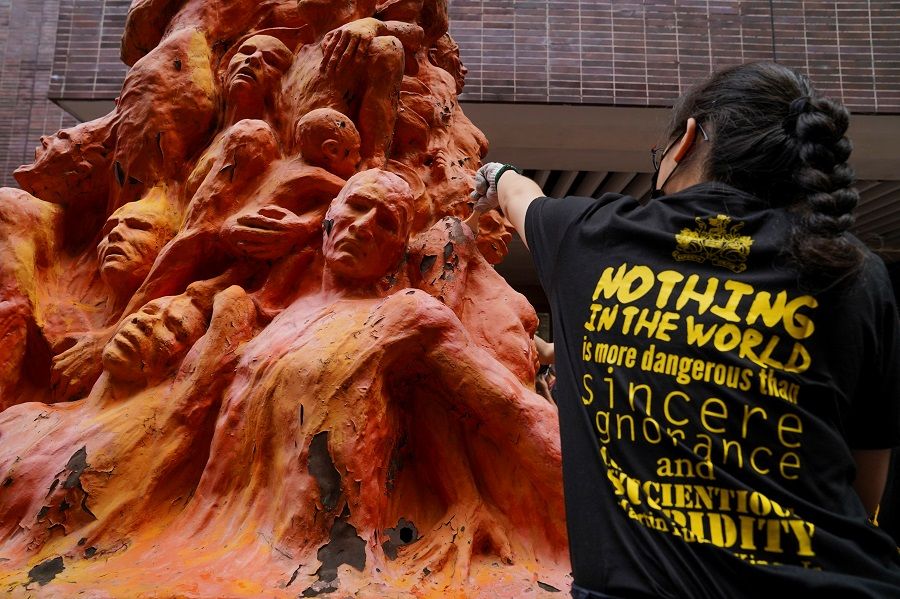
At the party, I wonder how the other guests, all young and with successful careers, view the home they now live in. After a few drinks, I work up the courage to ask them about their views of the future.
Leonard, a financier, says that while he thinks things will look great in the short term, the long-term picture will be quite different with Beijing zealously ramping up Hong Kong's "mainlandisation". He already has colleagues and competitors moving elsewhere, and thinks Singapore could be the region's next financial centre.
"You'll never know what Hong Kong will be like in five to 15 years. Many are thinking about whether to move to different financial centres as Beijing's stranglehold is only going to intensify - the city's Covid quarantine has posed enough problems", he says.
"What makes Hong Kong good is what Beijing wants to wipe out, so I see no advantage for us."
A report from the European Chamber of Commerce in Hong Kong shows that nearly half of all European businesses in Hong Kong are considering relocating, of which 25% plan to leave for greener pastures. A similar survey by the American Chamber of Commerce indicates that 44% of its members and 26% of surveyed companies are considering relocation. Business executives cite the national security law as the cause of a growing sense of uncertainty among businesses.
A cat-and-mouse game is in progress between the defiant few and riot officers in the Causeway Bay district. Every time a new video is captured, the phone buzzes.
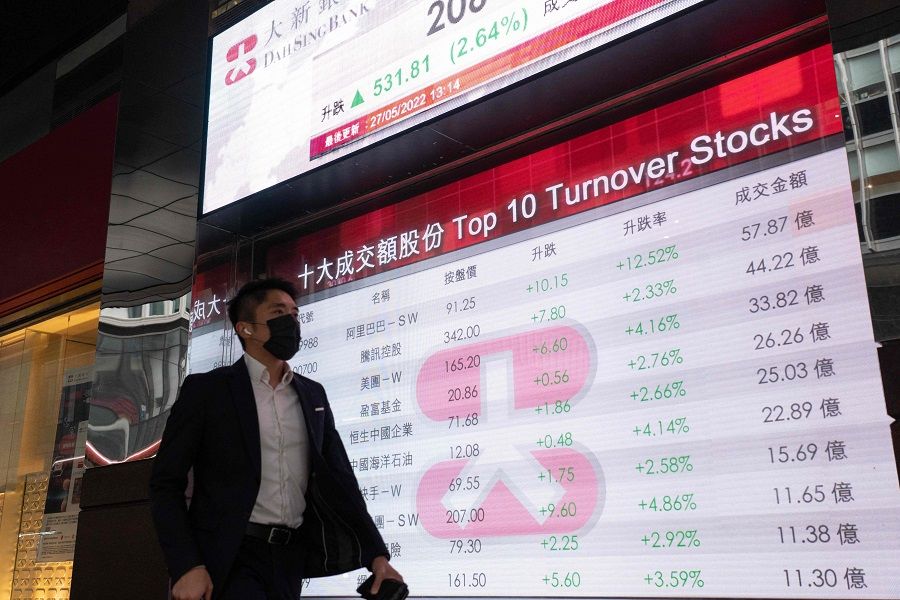
Even hiring managers are bearing the brunt of the departures. A Hong Kong General Chamber of Commerce survey shows that 38% of the companies feel a "medium" or "high" business impact from the latest exodus.The outgoing Chief Executive Carrie Lam, who was previously dismissive about the emigration wave, admitted that stringent pandemic controls may have caused the emigration wave but denied that the security law had a part to play.
Meanwhile, our conversation keeps getting interrupted. Footage of riot officers searching and, on one occasion, arresting bystanders is circulating on Telegram and Facebook. A cat-and-mouse game is in progress between the defiant few and riot officers in the Causeway Bay district. Every time a new video is captured, the phone buzzes.
In fits and starts, the conversation continues.
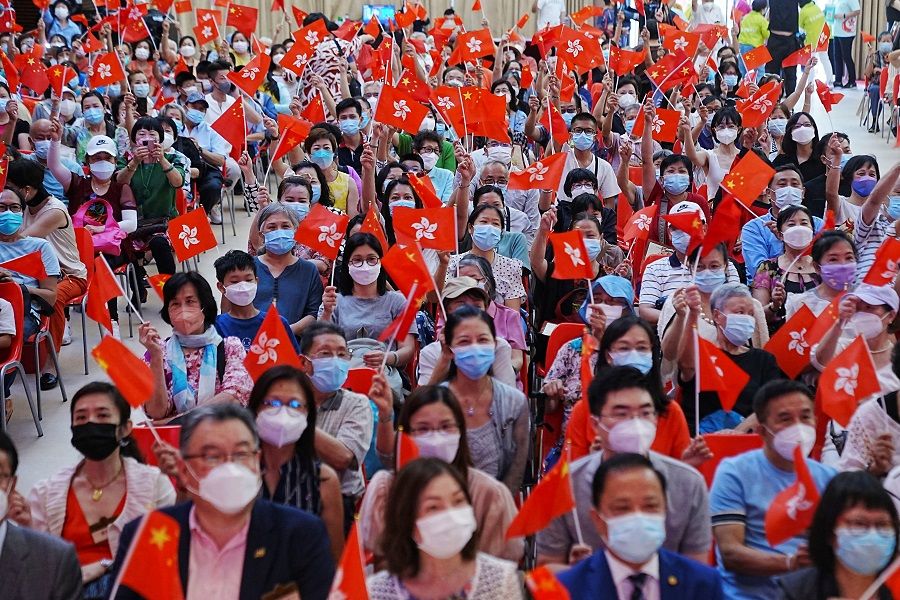
Harvey, Leonard's boyfriend, who works as a tertiary educator, sees a similar outcome in Hong Kong's education system. He believes that the government's changes to the secondary school's syllabus, such as greater emphasis on China's role, are incompatible with reality, and the talented students will eventually emigrate. Out of all changes, the cancellation of liberal studies in secondary school bothers him the most.
"The problem is that if we're embracing China's education, why isn't our education system the same as China's? The two systems are teaching completely different things. If they merge, Hong Kongers will gain nothing, with Mandarin being the focus and everything else sidelined," he says.
But maybe this gap is shrinking. As the city commemorates 25 years since its handover from the UK to China, new history textbooks soon rolling out to classrooms will apparently teach that Hong Kong was never a British colony and follow Beijing's narrative that the 2019 protest was driven by "external forces".
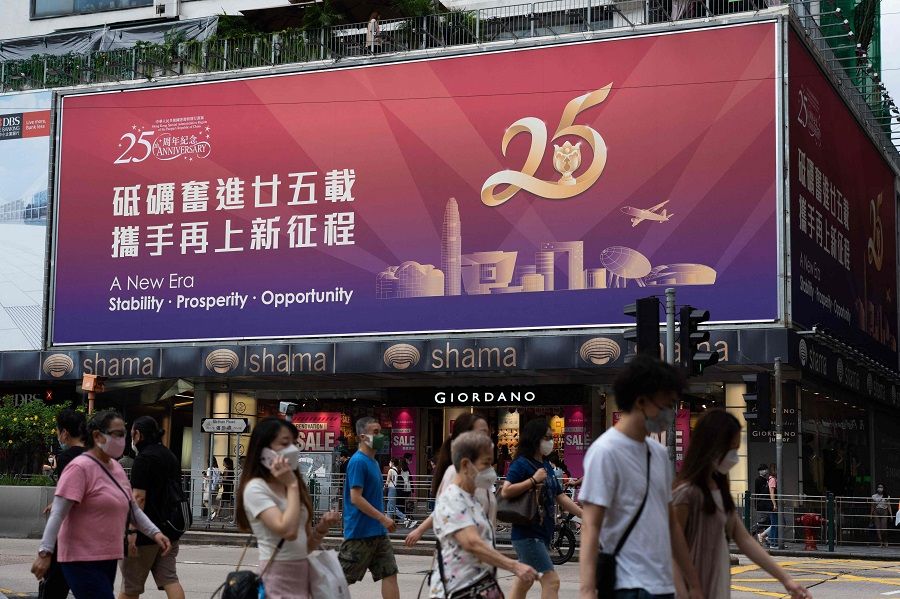
The revision is in line with Beijing's ongoing rewriting of Hong Kong's historical narrative to "protect young minds" and raise loyal citizens. China's state media Global Times lauded the move as a means to stop teachers from conveying "wrong and poisonous political views to students". These books will replace the earlier-mentioned liberal studies syllabus. Meanwhile, students and teachers are leaving behind their schools and city in droves, many using the BNO scheme to move to the UK.
"Hong Kong has no edge in the GBA, and Hong Kongers are outnumbered by talent demanding fractions of the necessary Hong Kong salary. How can we youngsters compete there with all odds stacked against us?" - Beatrice, who usually holds China-friendly views
More competition, more push factors
The conversation naturally goes on to the Greater Bay Area scheme, Beijing's grandiose brainchild for the southern Guangdong region. Commonly known as the GBA, the goal is to integrate Hong Kong and Macau, two former Western colonies, with nine other cities to create an economic and tech powerhouse spanning 56,000 square kilometres akin to San Francisco's Bay Area.
Surprisingly, Beatrice, a friend of mine and another guest who usually holds China-friendly views, seems indifferent.
"Hong Kong has no edge in the GBA, and Hong Kongers are outnumbered by talent demanding fractions of the necessary Hong Kong salary. How can we youngsters compete there with all odds stacked against us? I really think our future should be about doing our best in Hong Kong or doing what we want overseas," she says.
"Hong Kong has its unique edge. It's the government's job to discover and amplify it, but that's not happening."
. . . . . .
The government's GBA Youth Employment Scheme launched in 2020 reserved over 3,494 subsidised spots from 417 businesses for graduates. 1,090 of these spots were filled in over a year, and 65% of the applicants would earn HK$18,000 per month - roughly the city's median wage.
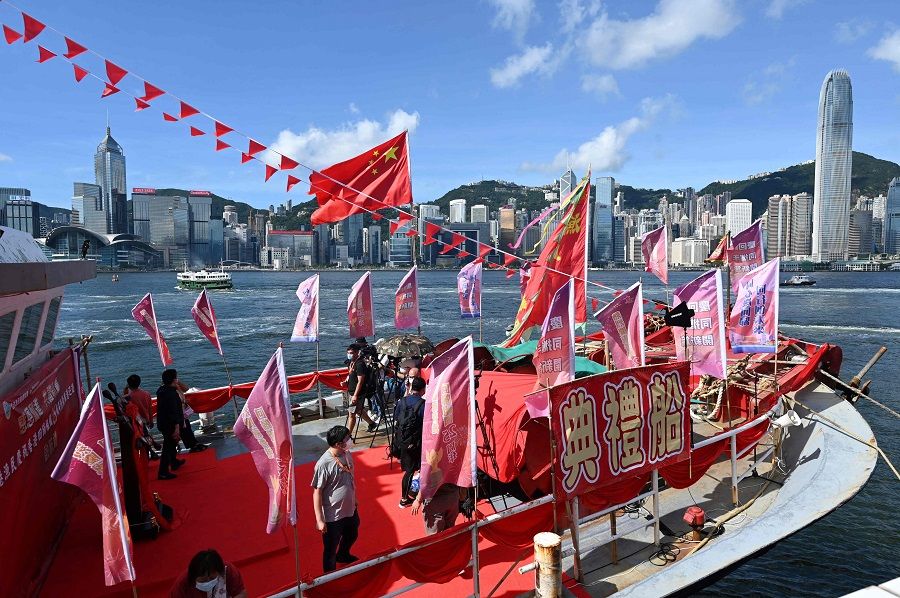
Gary Ng, senior economist at Natixis told me that the GBA is a concept that aims to integrate the region but doesn't add much to Hong Kong's pre-existing advantage. While Hong Kong youths can get an extra option, he believes the question is whether it is attractive and relevant. Structural problems like salary imbalance and incompatible economic structure remain unsolved.
Ng said that back in the 1980s, entrepreneurs and factory owners flocked to southern Guangdong without explicit government policies. He believes a favourable economic environment, rather than induced policies, can drive change.
"In places like Guangzhou and Shenzhen, there are different hefty subsidies for tech startups from Hong Kong, and this has seen some success in incentivising entrepreneurs to work in the mainland," he said.
"Yet it's perplexing to see Hong Kong's government pushing their younger generation to work elsewhere whereas everywhere else is doing the opposite - not to mention it is getting easier for mainland talent to find work in Hong Kong."
The material trumping the sentimental
A week after the housewarming party, I put the same question to Cecilia, a recent graduate who had found her first job in a local startup company: "What do you think about the GBA scheme?"
"... the border closure deprives Hong Kong of its role as an air transit point, and slowly Hong Kong will lose its international leverage." - Cecilia, a recent graduate
Like the others, she did not seem very enthused about the government's GBA pitch, naming the living environment and gruelling working culture a turnoff. She is also concerned that Hong Kong's hastened integration with the mainland and prolonged isolation under one of the world's most stringent pandemic measures could chip off its competitiveness - and the youth's prospects.
"This sort of integration has lowered many of the original job requirements. The educational requirements for the recently introduced mainland healthcare professionals are lower than those in Hong Kong, which can affect the livelihood of young people here," she said. "Also, the border closure deprives Hong Kong of its role as an air transit point, and slowly Hong Kong will lose its international leverage."
Like Vanessa and tens of thousands of younger people before him, Clement hopes to settle in the UK after finishing his studies.
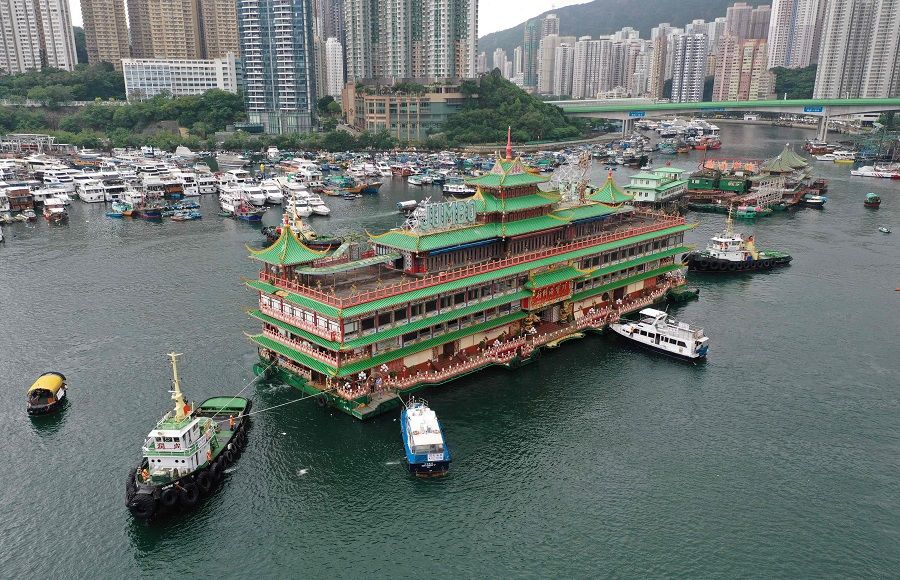
Clement, a 28-year-old in the logistics industry, offered similar views. Already paving his way for a post-grad programme in the UK, he views the government's GBA programme with lethargy and looks with disdain at the mainland's working culture and bureaucracy. Like Vanessa and tens of thousands of younger people before him, Clement hopes to settle in the UK after finishing his studies. He will be leaving Sarah, his 22-year-old girlfriend behind for now but she will join him next year.
"Monetary incentives would not be attractive if the legal and political realities remain unchanged. Freedom is much bigger than money." - Clement, a 28-year-old in the logistics industry
"Policies in China always change out of the blue. One day they provide you with resources and incentives, but they can withdraw them all the next day," Clement said. "Monetary incentives would not be attractive if the legal and political realities remain unchanged. Freedom is much bigger than money."
. . . . . .
Another week later, as I was getting off work, I texted Vanessa again to ask if she would return to this city. The monsoon had lasted for a fortnight and people were hurrying home holding umbrellas. The concrete paths were dotted with grey, murky puddles and the thick clouds made the early evening seem darker than usual. I walked out of the office building and joined the thousands rushing back home.
"Unless they allow us to decide our future without exerting any form of interference and control, even if there is universal suffrage, I won't be coming back." - Vanessa, 21-year-old student
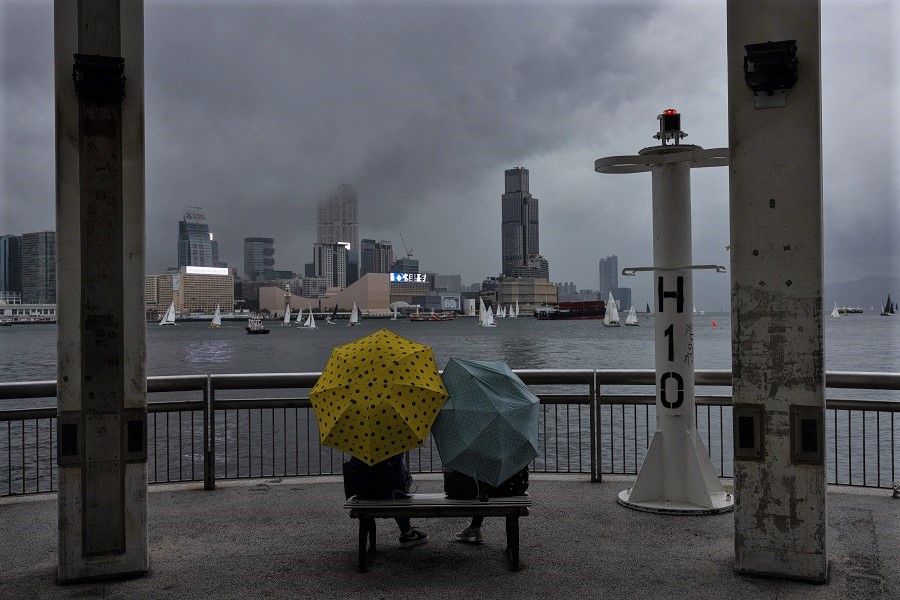
The scene reminded me of Karen Cheung's autobiography The Impossible City: A Hong Kong Memoir and her poetic description of Hong Kong's summer:
"The downpour feels deliberate, overdone. The water is charging down the steps, drenching our concrete pavements, dripping from the banyan trees...still we're pointing to the sky, mumbling to ourselves: it's crying."
Later at night, the phone buzzed again, just like during the house party. Only this time, it was Vanessa's reply: "Unless they allow us to decide our future without exerting any form of interference and control, even if there is universal suffrage, I won't be coming back."
*Names have been changed for respondents except for Gary Ng.
Related: 25 years after the handover: The 'end for Hong Kong' or just the beginning? | The fight against Omicron reveals Hong Kong's disunity | [Photo story] Hong Kong national security law: A different birthday for Hong Kong | Resignation of university presidents in Hong Kong: Can politics and education be kept separate? | Beijing's 'cleansing' of Hong Kong industries: Who will be the next target? | Every man for himself as Hong Kong's opposition caves under weight of national security law | Hong Kongers moving to Taiwan: Temporary haven or permanent home? | Why Carrie Lam will never understand Hong Kong's youths
